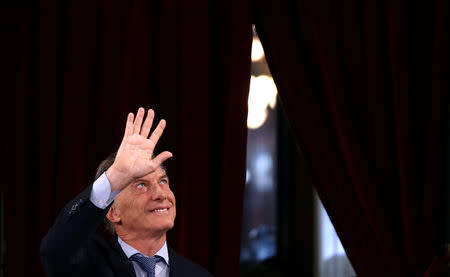Argentina's Macri to increase subsidies for poor families

By Cassandra Garrison and Gabriel Burin
BUENOS AIRES (Reuters) - Argentine President Mauricio Macri powered through continuous heckling by opposition lawmakers in Congress on Friday as the center-right leader delivered a heated State of the Union address ahead of running for a second term in October.
Macri announced a 46 percent increase in subsidies for poor families with children, the only new initiative included in his speech.
Macri has drawn sharp criticism for tax increases and spending cuts instituted to slash the fiscal deficit at a time when the economy is shrinking and the country has one of the highest inflation rates in the world. He said there was room for targeted increases in welfare spending.
"Since 2012 our country has not grown," said Macri, who was elected in late 2015 and has negotiated a $56.3 billion standby financing agreement with the International Monetary Fund.
"Today we are solving problems that are not circumstantial, they are structural. If we had not made the decisions we made, the economy would have collapsed," he said, referring to the state of the country under his predecessor, ex-president Cristina Fernandez, now a senator who may run for the office again this year.
Fernandez was not present for Macri's State of the Union.
While fellow lawmakers from Macri's "Let's Change" coalition erupted into applause as he spoke of Argentina's progress under his leadership, he was interrupted by opposition politicians, prompting Vice President Gabriela Michetti to call for silence.
"These insults, this yelling, says more about you than it does about me," Macri said at one point, pausing his speech to address the hecklers. In particular, he emphasized progress that he has made in the areas fighting crime and corruption.
It was a preview of what is expected to be a contentious general election in October.
Outside congress, thousands of demonstrators marched. Activists carrying banners and banging drums included union workers, social organizations and leftist groups opposed to Macri's fiscal tightening program. He has agreed with the IMF to wipe out the primary fiscal deficit this year.
Police used metal barriers to block access to Congress and control the crowd, which snarled traffic and caused road closures at main intersections in the city center.
(Reporting by Cassandra Garisson and Gabriel Burin; Writing by Hugh Bronstein and Cassandra Garrison; Editing by Chizu Nomiyama, Paul Simao and David Gregorio)

